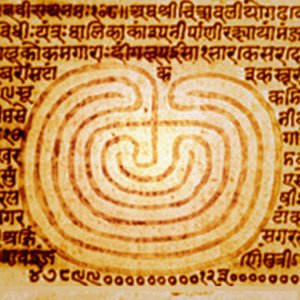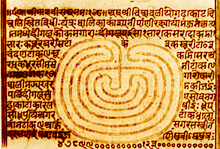Vak Ambhrini and Her Song of the Soul
by Satya Chaitanya
by Satya Chaitanya
Vak Ambhrini -- Vak, the daughter of the Rishi Ambhrina. Or Vagambhrini, as her name is pronounced when the two names are combined.
A rishika, female seer and author of mantras, in her own right.
Was she the first woman poet of the world?
We will never know. What we know for sure, though, is that she is among the oldest poets of the world. Her song appears in the Rig Veda. It is the hundred and twenty-fifth sookta of the tenth mandala [book] of the Rig Veda.
The most common name for it is Vak Sookta, though it is known by other names too, such as Atma Sookta, Song of the Soul, and Devi Sookta, Song of the Goddess.
The majestic beauty of the Vak Sookta makes us wonder if poetry has ever reached greater heights!
The Vedas themselves describe their poetry as joyous streams bursting forth from the mountains. The Vak Sookta is that -- a joyous stream bursting forth from the mountains.
But it is much more than that too. It comes to us with the power of a thundershower. The sookta is not just powerful, but power itself. It has at the same time the ephemeral loveliness of a rare winter blossom and the awesome majesty of the eternal Himalayas.
The earth singing the song of its soul -- that is what we feel when we go through the song, or, better still, when we let the song go through us. To experience the Sookta on a fine morning when the world is just awakening after a night's serene slumber is to have a bath in the most sacred of teerthas -- like a dip in the Manas Sarovar itself.
And you feel the presence the Lord of Kailasa in the sookta, as at the Sarovar. He is there, sanctifying every syllable of the timeless sookta. And with him is the Mother Goddess, sanctifying each word of Vagambhrini's sookta, and in the silences between the words.
Like other sooktas in the Vedas, the Vak Sookta too is a spontaneous outpouring of the poet-seer's soul.
An outpouring not from the ordinary dimension of human experience, but from the highest possible reaches of it. It is what we call revealed poetry.
It is not a deliberate composition, wherein the poet sits down and thinks of each word that will go into the making of the poem. No, there is nothing like that here.
The rishika has had a powerful experience -- the most powerful experience possible, a hundred times, maybe a thousand times, more powerful than the most powerful experience we can imagine.
The experience of herself, of her own self, an experience in which the experiencer, the experienced and the act of experiencing all merge and become one. An experience that is really no experience at all, since these distinctions have disappeared.
The experience of her self as the soul of the universe, its very being.
And she allows the ecstasy of her experience to pour out in words -- that is the Vak Sookta.
The Vak Sookta is pure splendor -- a celebration of the splendor that what we truly are. As we read it, listen to it, we feel poetry has never climbed to greater heights, nor reached more profound depths.
For what Vak experiences is that she is the mother of the universe, with all its gods and humans and every created thing. Hers is the ultimate spiritual experience, which the Upanishads speak of as 'aham brahmasmi'.
Here is the original sookta in Sanskrit and an English rendering of it:
Aham rudrebhir vasubhis charamyaham adityair uta visvadevaih
Aham mitra varunobha bibharmyaham indragnee aham asvinobha.
I move with the Rudras and also with the Vasus,
I wander with the Adityas and the Vishwadevas.
I hold aloft both Mitra and Varuna,
and also Indra and Agni and the twin Ashvins.
Aham somam ahanasam bibharmi
aham tvashtaram uta pushanam bhagam
Aham dadhami dravinam havishmate supravye yajamanaya sunvate.
I uphold Soma the exuberant;
I uphold Tvasta, Pushan, and Bhaga.
I endow with wealth the offerer of oblation,
the worshipper and the pious presser of the Soma.
Aham rashtri sangamani vasunam chikitushee prathama yajniyanam
Tam ma deva vyadadhuh puritra bhuristhatram bhooryavesayantim.
I am the ruling Queen,
the amasser of treasures,
full of wisdom,
first of those who are worthy of worship.
That me the Gods have installed in many places,
with many homes to enter and abide in.
Maya so annamatti yo vipasyati yah praniti ya i srnotyuktam
Amantavo mam ta upa kshiyanti srudhi sruta sraddhivam te vadami.
Through me alone all eat the food that helps them see,
breathe and hear the spoken word.
He is not aware of me,
yet he dwells in me alone.
Listen, you who know!
For, the words I speak to you deserve your trust.
Ahameva svayam idam vadami jushtam devebhir uta manushebhih
Yam kamaye tam tam ugram krnomi
tam brahmanam tam rshim tam sumedham
It is I who announces the tidings
that the gods and men alike rejoice to hear.
The man I love, I make mighty in strength.
I make him a priest, a sage, or a learned scholar, as I please.
Aham rudraya dhanura tanomi brahmadvishe sarave hantava u
Aham janaya samadam krnomi aham dyava prthivee a vivesa.
I bend the bow for Rudra that his arrow may slay the hater
of the words of sacred wisdom.
I rouse the people, and make them strive.
I have entered the Earth and Heaven, filling everything.
Aham suve pitaram asya murdhan mama yonir apsu antah samudre
Tato vi tishthe bhuvananu visvotamum dyam varshmanopa sprsami
I give birth to the creator
in the heavens
atop the world
and my own origin
is deep in the ocean,
in the cosmic waters.
From there
I permeate all existing worlds,
and even touch yonder heavens
with my forehead.
Ahameva vata iva pra vami arabhamana bhuvanani vishva
Paro diva para ena prthivi etavati mahina sam babhuva
It is my breath that blows as the mighty wind,
while I hold together all the worlds.
Beyond the heavens and above the earth I tower,
such am I in my might and splendour.
_______________________
Incidentally, the Rig Veda has an amazing thirty rishikas -- women seer poets -- whose works have come down to us from that ancient world! I know of no other major scripture, anywhere in the world, from any culture, that contains mystic poetry revealed to women.
Except in the Vedas, nowhere else were women considered fit for such revelations.
How sad, when you think of it! For it is far easier for women to experience the divine than to man and throughout history there must have existed countless women who have had such experiences. What an irreparable loss for us, their children!
~*~
SOURCE:
www.boloji.com/hinduism/160.htm



Thank you, Maestro, for this evidence that women have been Poets since the realist of times.
ReplyDelete